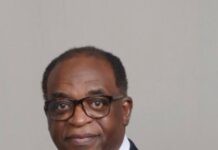
Email: ochima495@gmail.com
SMS: 08055001912
Our political parties have poor records of appreciating the architects of their electoral fortunes. It is part of the tragedy that has led to the lack of culture and tradition in our political parties as necessary institutional pillars of democracy. Here are some pieces of evidence.
The late Chief Solomon Lar, first national chairman of PDP, led the party to victory in the critical transitional general elections of 1999. The presidential election produced Chief Olusegun Obasanjo, who made history as the first military ruler in the country to return as a faux democrat and a civilian president. The greatest beneficiary of that election did not thank Lar for his leadership. In gratitude, Obasanjo made Lar’s tenure history.
The president then picked Chief Barnabas Gemade but dropped him before the 2003 general elections. Chief Audu Ogbeh succeeded Gemade and led the party to victory with Obasanjo’s re-election in the 2003 general elections. In gratitude, Obasanjo gave Ogbeh the same treatment he meted to Lar.
Chief John Oyegun was the first national chairman of APC. Under his leadership, the party won the general elections of 2015. Major-General Muhammadu Buhari, the man with the longest quest for political power in our country so far, got what he wanted and became president. He did what Obasanjo did – a former military dictator turned a faux democrat. But whatever Oyegun did to put the retired general where he had always wanted to be, did not save him. Buhari muscled him out as national chairman of the party in the firm tradition of political ingratitude.
Adams Oshiomhole, the former labour leader, and two-term governor of Edo State, succeeded Oyegun as national chairman of the party in 2018. He too led the party to victory and Buhari was re-elected for a second and final term in the 2019 general elections. And then his battle for survival began. He fought the governors but by 2020, he knew that the game was up. At the instance of Buhari, ostensibly acting to save the party that had already begun to haemorrhage, the national executive committee of the party gave him the red card. He stepped down as national chairman.
The governor of Yobe State, Mai Mala Buni, was appointed interim leader of the party and head of something called Caretaker/Extraordinary Convention Planning Committee. He was given a six-month mandate to put the house of the party in order. It proved a difficult task for him because the party at all levels was torn by internal crises and lack of internal democracy, the bane of our political parties in general. The party faced the increasingly dark prospects of the sun setting on it at noon. Buni was taking the party down the slope of irrelevance.
The party leaders stepped in. On September 14, 2022, it constituted a 9-member national reconciliation committee to patch up things and save the party from the clear danger of a short shelf life. Senator Abdullahi Adamu, a ranking senator, was appointed chairman of the committee. The party leadership charged his committee with three assignments, the most critical to the party being to “conduct appropriate engagement between identified groups in each state where there are disputes with a view to bringing about genuine reconciliation and establishing lasting peace and unity in the party.” An onerous task given the state of the party at the state level.
Buni swore in the committee on October 14, and it set to work. The committee found that matters were much worse for the party at the state level than its leaders appreciated. It had been polarised into irreconcilable warring factions – a clear and obvious danger to it retaining its place in Aso Rock in the 2023 general elections.
As I pointed here in an earlier column, “Adamu is a savvy politician with the unusual gift of quickly seeing and appreciating political problems. He has a demonstrated knack for throwing himself into assignments, heart and soul, because it is always important for him to leave his size 11 shoe size footprints along whatever path he passes through in his political career.” He needed no one to tell him that the fate of the party would be determined by the work of his committee.
With his single-minded commitment, he pulled the chestnuts from the fire. He did what other party leaders feared would never happen, i.e., make APC one cohesive political family again, given the deep fissures and the frayed nerves among the leaders and the frustrated members of the party. The party had begun to bleed badly. He reconciled the warring factions to prepare the party for this year’s transitional general elections.
This knack propelled Adamu forward and upward. Buhari and the party leaders decided he was the right man to implement the findings and the recommendations of his reconciliation committee. He was elected national chairman of the party on March 26 last year. Some element of poetic justice was at play here. Adamu, never afraid of taking on tough tasks, left the senate to take on the more challenging task of saving his party. He staked his integrity on doing almost the impossible – leading APC to victory in the 2023 general elections.
He was true to himself and to his party and, as the common saying goes, he delivered against certain odds in the nomination process that produced Asiwaju Bola Ahmed Tinubu as the party’s presidential candidate on June 8 last year. Jagaban went on to win the presidential election last February. Adamu pulled the party from the jaws of certain the defeat that stared it in the face. Given the record of Buhari’s non-stella performance in office, APC stood on shaky moral grounds to ask the electorate to retain it in power in the 2023 general elections. Those who predicted its defeat were not being mischievous. But the rest is now history.
The party has now entered a new phase of challenges as critical, if not more so, than its winning the elections. I suppose this is the time for the leaders of the party, including the president, to begin the task of managing their victory. Winning is a difficult task but sustaining victory is even more complex than that.
The atmosphere is being polluted by the lethal combination of weaponized fake news, conspiracy theories, ignorance, and the sheer inclination by the online and social media to mislead, misinform and miseducate the public. We are in danger of being swamped by the combination of these blights that have distorted the noble mission of the mass media as a critical and important national institution. No one should think this is a child’s play.
The lies about the president’s alleged frosty relationship with Adamu are, of course, lies. But lies, once sold to the public takes on lives of their own. The liar has a purpose in suggesting that that there is a frosty relationship between Adamu continuing in his current position in the party. It is an unholy attempt to drive a wedge between him and the president. There is always a purpose to all madness.
Tinubu is not Obasanjo, and he is certainly not Buhari. He should not invite himself to walk along their path. His administration has much to gain from a stable, cohesive, and united APC. He would be unfair to himself were he, through acts of insouciance, allow the party to regress back to what it was before Adamu and his committee responded to the challenges of saving it from itself. A crisis fomented at this time in the life of the Tinubu administration would also affect the president’s capacity to chart a new path for the nation. He cannot afford to be distracted from the path he has mapped out for himself as president. Our faith in his avowal to renew the nation is hinged on his capacity to think differently and act differently.
This is not about saving Adamu’s job. It is about stability in the ruling party and what the nation stands to gain from the president and the party managing their victory so the country could renew its faith in itself. A stable APC will discharge its duty as the custodian of the governments elected on its platform. It will police how its servants in government fulfil its manifesto, being its contract with the people.



